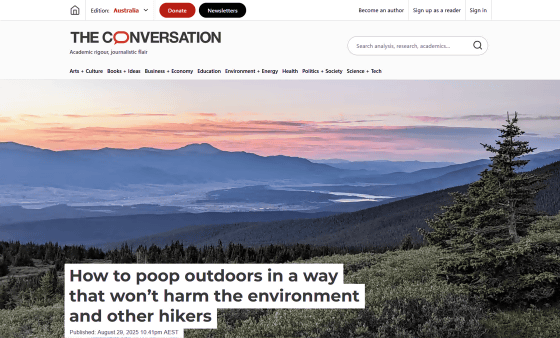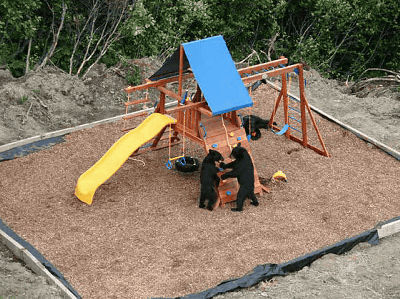Experts give lectures on 'What to be careful of when pooping outdoors while hiking or climbing'

Some people who enjoy hiking or mountain climbing may have had the urge to defecate when there were no toilets nearby and were forced to defecate outdoors.
How to poop outdoors in a way that won't harm the environment and other hikers
https://theconversation.com/how-to-poop-outdoors-in-a-way-that-wont-harm-the-environment-and-other-hikers-262426

Edelson and his colleagues point out that contamination by human waste is a major public health concern in natural areas, as pathogens contained in human waste can remain active outdoors for long periods of time, sometimes even a year or more, potentially causing gastrointestinal and other illnesses in future visitors.
It can also lead to water pollution when waste gets into water sources during storms or melting snow, and of course, encountering human waste or soiled toilet paper while hiking or climbing can be unpleasant for recreational visitors.
Human waste is a problem all over the world, from the Appalachian Mountains to Mount Everest to national parks in Norway and New Zealand . The problem has gotten so bad in the Eagle-Holy Cross section of Colorado's White River National Forest that visitors are now required to pick up their waste.

The most effective way to reduce outdoor defecation is, of course, thought to be the provision of public toilets, and it has been found that hikers also prefer to use toilets located at trailheads and other locations.
However, installing public toilets requires accessibility for maintenance and waste disposal costs, and toilets are often not available in remote areas of nature reserves or along steep mountain trails. Furthermore, even if there is a toilet at the trailhead, it is not uncommon to find that it is far away when you need to use it.
In addition, surveys have shown that the majority of people who go hiking or mountain climbing are unaware that excrement is an environmental problem. Even if they are aware of this, they may not prepare in advance because they think it is too much trouble or is not important.

Previous research has shown that clear, actionable messaging is key to reducing impacts on nature reserves. Leave No Trace , an organization that has been educating outdoor recreationists about open defecation for over 30 years, recommends two methods for defecation in the open:
◆1: Take everything home
When defecating outdoors, you can reduce your impact on the environment by putting all waste and toilet paper into a portable toilet or special bags and disposing of them at the trailhead or at home.
The portable toilets contain sturdy inner and outer bags to prevent leaks, as well as desiccants to reduce odors. A survey of visitors to a Norwegian nature park found that 30% of those who defecated while hiking used a portable toilet, and 87% of those who did so expressed a willingness to use one on future hikes. 'These results suggest that people are willing to do the right thing if they are given the right tools and information, and that we can effectively teach people how to protect wild spaces,' Edelson and his colleagues wrote.
Portable toilets are also useful in emergencies, so it's a good idea to have one even if you're not into outdoor activities.
Have you forgotten to stock up on toilet supplies? (METI/Ministry of Economy, Trade and Industry)
https://www.meti.go.jp/policy/mono_info_service/mono/jyutaku/toirebichiku.html
◆2: Bury in the ground
Another method is to dig a small hole in the ground and bury the excrement there. If it is difficult to defecate directly into the hole, it is fine to defecate nearby and then bury the excrement in the hole later. A suitable place for digging a hole is one that meets the following criteria: 'The soil can be dug to a depth of about the length of a hand,' 'The soil is moist, allowing the excrement to decompose easily,' and 'Digging the hole is unlikely to disturb the environment.'
Additionally, dig the hole about 70 steps away from any water source, footpath, or campsite to reduce the risk of water contamination and someone accidentally coming into contact with the excrement. One thing to keep in mind when burying the hole is to be sure to take any non-biodegradable wet wipes with you. Experiments have shown that tissues and toilet paper do not easily decompose, so it may be safer to either be careful to take these with you or prepare a portable toilet from the start.
Is it okay to throw tissues and toilet paper in the mountains? | Hokkaido Regional Environment Office | Ministry of the Environment
https://hokkaido.env.go.jp/blog/page_00016.html
Related Posts:
in Science, Posted by log1h_ik







